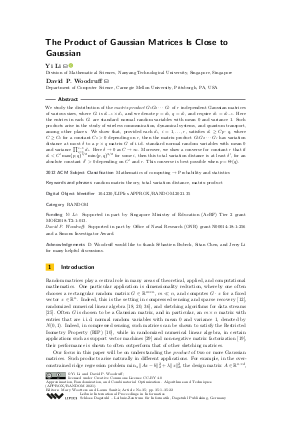LIPIcs.APPROX-RANDOM.2021.35.pdf
- Filesize: 0.73 MB
- 22 pages

 Creative Commons Attribution 4.0 International license
Creative Commons Attribution 4.0 International license

We study the distribution of the matrix product G₁ G₂ ⋯ G_r of r independent Gaussian matrices of various sizes, where G_i is d_{i-1} × d_i, and we denote p = d₀, q = d_r, and require d₁ = d_{r-1}. Here the entries in each G_i are standard normal random variables with mean 0 and variance 1. Such products arise in the study of wireless communication, dynamical systems, and quantum transport, among other places. We show that, provided each d_i, i = 1, …, r, satisfies d_i ≥ C p ⋅ q, where C ≥ C₀ for a constant C₀ > 0 depending on r, then the matrix product G₁ G₂ ⋯ G_r has variation distance at most δ to a p × q matrix G of i.i.d. standard normal random variables with mean 0 and variance ∏_{i = 1}^{r-1} d_i. Here δ → 0 as C → ∞. Moreover, we show a converse for constant r that if d_i < C' max{p,q}^{1/2}min{p,q}^{3/2} for some i, then this total variation distance is at least δ', for an absolute constant δ' > 0 depending on C' and r. This converse is best possible when p = Θ(q).


























Feedback for Dagstuhl Publishing